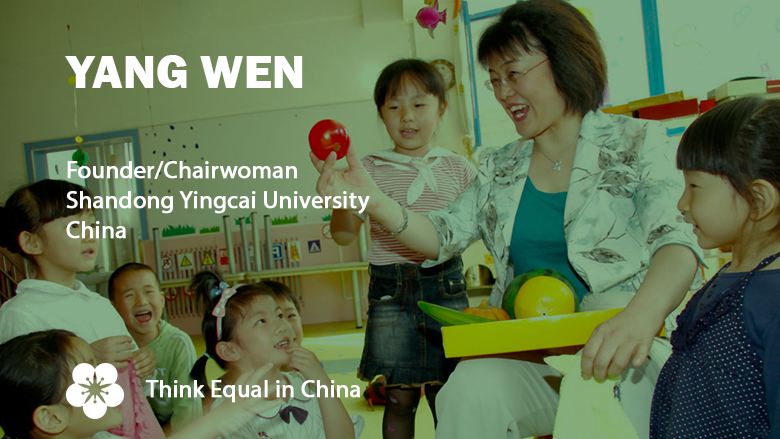Tell us about yourself.
In 1990, funded by a World Bank loan, I went to study at the University of Nottingham in the UK, a key turning point for me to embark on the road of entrepreneurship.
Upon returning to China, I resigned from Shandong University, and founded Shandong Yingcai University. As a degree-level university approved by the Ministry of Education, Yingcai now has educated more than 100,000 people. For the 8th consecutive year, the school ranks Top 3 in the Private Higher Education Institution Ranking in China. In 2017 and 2018, it ranked 1st place in the Comprehensive Private University Ranking.
My English for Children textbook series sold more than 1 million copies. The books English Pedagogy for Children and English for Preschool Education have filled a need in China. This pedagogy was recognized as one of the 10 Major Schools of Chinese Contemporary Foreign Language Pedagogies.
Enthusiastic about philanthropy, I set up a “China's 10 Most Outstanding Mothers” or the Yang Wen Scholarship totaling RMB 30 million (US$ 447,556), and enabling 4,000 students to complete college studies. I have also delivered a keynote series on family education at Shandong People's Broadcasting Station, wrote columns for China Women’s News, and published books such as “Growing up with My Son” and “Let's Be the Best Mothers” catering to thousands of families.
What inspires you to get up in the morning? What drives you?
It is not an alarm clock that wakes me up, but a dream.
What set you on this path?
It is still a dream. From a textile worker to a college student, from an overseas scholar to a kindergarten teacher, from a public university professor to a private university founder, my dream has been to establish a good university to enable more Chinese children to receive higher education.
What advice do you have for young women who want to take a similar path?
Just do it NOW! Nothing is impossible!
Do you have a favorite quote or saying?
The potential of the mind determines the potential of the accomplishment. No pain, no gain.
What are the biggest issues in China right now and how can they be addressed?
The most difficult thing is our economic transformation, towards a higher, better and more innovative economy. During this economic transition from scale to quality, new technologies, new industries, new businesses and new models are still being explored. Along with deepening the upgrade of education reform, China has to cultivate more innovative talents and provide solid support for its economic transformation and development.
Where do you see China in 25 years?
By that time, China’s Two Centenary Goals will have been largely fulfilled. China's ecological environment will be better, with bluer skies, clearer water, greener mountains and cleaner air. China’s overall national strength will be bigger, its economy stronger, and society more harmonious. The young will receive education, the elderly will receive support, and people's lives will be more affluent.
What change would you like to see that could bring greater equality in China?
Gender equality is a basic national policy in China. As a Chinese woman, I see that China has achieved basic gender equality in terms of education, employment, starting a business, political and social participation, and in family.
If you could use one word to describe women in East Asia Pacific what would it be?
Tenacious.
*The views expressed in this article do not necessarily represent the views of the World Bank Group and its employees.

